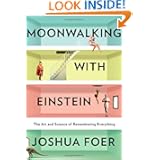Books of 2011: 23. Moonwalking with Einstein, by Joshua Foer

At the 2005 U.S. Memory Championships, Joshua Foer -- an average-memory journalist doing research for a story on the world's smartest people -- watched in awe as mental athletes memorized decks of cards in mere minutes, memorized hundreds of random numbers, words, names, and faces. The next year, he was competing alongside them.
While it might appear that feats of memory are the bastion of savants and freaks, mnemonists insist that anyone who's willing to put in time and effort can do what they do. Like all magic, once you know the trick, it's not nearly as thrilling. Joshua Foer decided to put the theory to the test, studying for an hour a day under the tutelage of some of Europe's foremost mentalists. (It's a small club.)
The foundation of Foer's memorization practice was the art of constructing "memory palaces," a technique that dates back to ancient Rome. With it, ancient and medieval scholars memorized entire books. Though almost no one has heard of it today, it was once incredibly popular, perhaps the most popular method of bulk memorization. Foer also learned techniques like the "major system" for memorizing numbers and the "PAO system" (person-action-object) for memorizing decks of cards.
Today it might seem like the art of memorization is unnecessary. After all, we've got computers, calendars, smart phones, and all sorts of other devices to remember things for us. We read extensively (skimming for the gist of a wide variety of works) rather than intensively (memorizing individual texts so they may be digested at a later date). But is a gist really the same as internalizing information? Can we really say we "know" something when we must look it up every time we want to remember it? These are some of the questions Foer poses, particularly given the speed at which our electronic, external brains are advancing.
Sadly for an aspiring bard like me, the field of mnemonics doesn't offer much by way of word-for-word memorization, the sort you need for poetry. Apparently ancient epic poets would be trained in the form of the poetry and then effectively re-compose the poem every time they told it, which is why the Iliad and Odyssey have so many repetitions of "wine-dark sea" and "swift-footed Achilles," even when he's sitting still. It fits the meter. (Fun fact: you can also play this game with pop songs. Give me a song with the line "I'll love you from the morning light" and I will bet money that the next line ends with "night.")
In the end, this is a fascinating book. If anything, it proves that just about anyone can vastly improve their memory for speeches, books, names, and phone numbers without too much effort. I haven't personally tried the techniques yet, but it sounds like it might be fun.